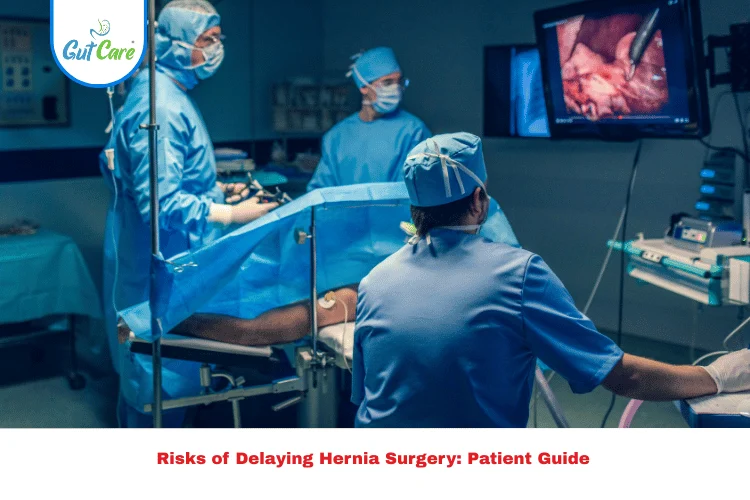When it comes to digestive health, understanding Hiatal Hernia Types is essential for proper diagnosis and care.
A hiatal hernia occurs when a part of the stomach pushes upward through the diaphragm into the chest area. This can cause symptoms like chest discomfort, heartburn, and acid reflux, affecting overall digestion and comfort.
At Gutcare Clinics, Bangalore, Dr. Yuvrajsingh Gehlot, an experienced colorectal surgeon, provides expert evaluation and advanced treatment options for patients with various types of hernias, including hiatal hernias. His patient-focused approach ensures safe, effective, and long-term relief.
This guide will help you understand what is a hiatal hernia, explore the different hiatal hernia types, recognize common symptoms, and learn about the best treatment options available. With the right awareness and timely care, managing this condition becomes much easier and more effective.
What is a Hiatal Hernia?
To understand hiatal hernia types, it’s important first to know what a hiatal hernia means. The diaphragm is a muscle that separates the chest from the abdomen. Normally, the stomach sits below the diaphragm, but in a hiatal hernia, part of the stomach pushes upward through a small opening called the hiatus.
There are both large and small hiatal hernia cases. A small hiatal hernia may not cause noticeable symptoms, while larger ones can lead to heartburn, acid reflux, and chest discomfort.
Common Hiatal Hernia Causes
Several factors can lead to the development of a hiatal hernia. Understanding hiatal hernia causes helps in both prevention and management:
- Weak diaphragm muscles – Often related to aging.
- Increased abdominal pressure – Caused by heavy lifting, straining, or chronic coughing.
- Obesity – Excess weight can put pressure on the abdomen.
- Pregnancy – Increased pressure from the growing uterus.
- Genetic predisposition – Family history can increase risk.
At Gutcare Clinics, patients receive a thorough evaluation to identify specific hiatal hernia causes and the most effective treatment plan.
Types of Hiatal Hernia
There are mainly two Hiatal Hernia Types that doctors identify:
1. Sliding Hiatal Hernia
This is the most common form, where the stomach and the lower esophagus slide up into the chest cavity. It often causes hernia symptoms such as heartburn, bloating, and regurgitation of stomach acid. Symptoms may worsen when lying down or after heavy meals.
2. Paraesophageal Hiatal Hernia
This less common type happens when part of the stomach pushes through the diaphragm and sits beside the esophagus. While it may not always cause hernia symptoms, it can lead to serious complications if the blood supply to the stomach is reduced.
Recognizing hiatal hernia types early allows for timely treatment and prevents complications.
Recognizing Hiatal Hernia Symptoms
Identifying hernia symptoms is important for early diagnosis. Common signs include:
- Heartburn or acid reflux
- Chest pain or discomfort after eating
- Difficulty swallowing
- Shortness of breath in severe cases
- Bloating or frequent burping
While mild cases may improve with lifestyle changes, persistent hernia symptoms should not be ignored. Consultation with a specialist like Dr. Yuvrajsingh Gehlot at Gutcare Clinics, Bangalore ensures accurate diagnosis and professional care.
Hiatal Hernia Treatment Options
The best hiatal hernia treatment depends on the type and severity of the condition. Treatment options include:
1. Lifestyle Modifications
- Eat smaller, more frequent meals.
- Avoid lying down immediately after eating.
- Maintain a healthy weight to reduce abdominal pressure.
- Quit smoking to improve digestion and muscle function.
2. Hiatal Hernia Medication
Doctors may prescribe hiatal hernia medication such as:
- Antacids to neutralize stomach acid.
- Proton pump inhibitors (PPIs) to reduce acid production.
- H2 blockers for longer-lasting relief.
3. Surgical Treatment
If symptoms persist or complications arise, surgical repair may be necessary. At Gutcare Clinics, minimally invasive procedures are performed for faster recovery and minimal discomfort.
Small Hiatal Hernia: When to Worry
A small hiatal hernia often goes unnoticed and might not require treatment unless symptoms appear. However, ignoring persistent hernia symptoms like chest pain or reflux can lead to further complications.
Dr. Yuvrajsingh Gehlot recommends periodic monitoring and a balanced diet to prevent symptom flare-ups.
Why Early Diagnosis Matters
Recognizing and treating Hiatal Hernia Types early helps prevent long-term complications such as chronic reflux or esophageal irritation.
At Gutcare Clinics, Bangalore, patients receive comprehensive evaluation, accurate diagnosis, and advanced hiatal hernia treatment plans tailored to individual needs. Early medical guidance ensures better digestive health and long-lasting relief.
Conclusion
Understanding Hiatal Hernia Types allows individuals to identify symptoms early and seek the right care. Whether it’s a small hiatal hernia or a more severe form, timely diagnosis and appropriate hiatal hernia treatment can greatly improve comfort and quality of life.
For expert consultation, visit Gutcare Clinics, Bangalore, where Dr. Yuvrajsingh Gehlot, a skilled colorectal surgeon, provides professional, safe, and patient-centered treatment for all hernia-related concerns.
FAQs on Hiatal Hernia Types
1. What is a hiatal hernia, and how does it occur?
A hiatal hernia happens when part of the stomach moves into the chest through the diaphragm. It can be caused by weak muscles, pressure, or aging.
2. What are the common hiatal hernia symptoms?
Typical symptoms include heartburn, acid reflux, bloating, and difficulty swallowing. Some people with a small hiatal hernia may not feel any symptoms.
3. How are hiatal hernia types diagnosed?
Doctors use endoscopy, X-rays, or barium swallow tests to identify hiatal hernia types and decide on the right hiatal hernia treatment.
4. What medications are used for hiatal hernia treatment?
Hiatal hernia medication includes antacids, PPIs, and H2 blockers to reduce acid and manage reflux effectively.
5. Where can I get expert care for hiatal hernia in Bangalore?
At Gutcare Clinics, Bangalore, Dr. Yuvrajsingh Gehlot, an expert colorectal surgeon, provides advanced diagnosis and hiatal hernia treatment for all hiatal hernia types.




